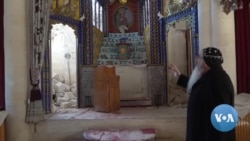ທ່າມກາງຜູ້ຄົນຫຼາຍຮ້ອຍພັນຄົນ ທີ່ໄດ້ຮັບຜົນກະທົບຈາກແຜ່ນດິນໄຫວໃນຊ່ວງຕົ້ນເດືອນກຸມພາທີ່ຜ່ານມາຢູ່ ໃນປະເທດເທີກີ ແມ່ນສາສະໜາກຸ່ມນ້ອຍ ທີ່ຮ້ອງພູມິພາກແຫ່ງນີ້ວ່າບ້ານເກີດ. ຊຸມຊົນຕ່າງໆເຫຼົ່ານີ້ກໍປະເຊີນກັບຄວາມສູນ ເສຍຊີວິດແລະຊັບສິນຕ່າງໆເຊັ່ນດຽວກັນກັບປະຊາຊົນຊາວເທີກີຄົນອື່ນໆ, ແລະ ໃນບາງກໍລະນີ, ການດໍາລົງຊີວິດເພື່ອຄວາມຢູ່ລອດ ຂອງພວກເຂົາເຈົ້າ ກໍຢູ່ໃນຄວາມສ່ຽງ. ເອເຊລ ຊາຮິງກາຢາ (Ezel Sahinkaya) ມີລາຍງານກ່ຽວກັບເລື້ອງນີ້ໃຫ້ VOA, ເຊິ່ງ ທິບສຸດາ ຈະນໍາເອົາລາຍລະອຽດມາສະເໜີທ່ານ ໃນອັນດັບຕໍ່ໄປ.
ທ່ານມໍ ກຣີໂກຣຽສ ເມລກີ ຢູເຣັກ (Mor Grigorios Melki Urek) ກ່າວເປັນພາສາເທີກີວ່າ:
“ນີ້ແມ່ນສະຖານທີ່ສໍາລັບພິທີບູຊາ, ແລະຢູ່ທາງເບື້ອງຕາເວັນອອກທັງໝົດຂອງສະຖານທີ່ດັ່ງກ່າວ ໄດ້ຖະຫຼົ່ມລົງມາສູ່ພື້ນດິນ.”
ທ່ານມໍ ກຣີໂກຣຽສ ເມລກີ ຢູເຣັກ, ແມ່ນພະສັງຄະລາດອາດີຢາແມນ ກໍາລັງສະແດງໃຫ້ VOA ເຫັນວ່າ ແຜ່ນດິນໄຫວໃນວັນທີ 6 ກຸມພາ ໄດ້ສົ່ງຜົນກະ ທົບຫຍັງແດ່ ຕໍ່ໂບດຂອງເພິ່ນ.
ປະຊາຊົນຫຼາຍລ້ານຄົນໄດ້ຮັບຜົນກະທົບຈາກແຜ່ນດິນໄຫວ, ລວມທັງສະມາຊິກ ຂອງສາສະໜາຄຣິສ ແລະສາສະໜາຢິວ ຊຶ່ງເປັນສາສະໜາກຸ່ມນ້ອຍ.
ນຶ່ງໃນຈໍານວນຫຼາຍໆເມືອງທີ່ໄດ້ຮັບຜົນກະທົບຈາກແຜ່ນດິນໄຫວນັ້ນ ລວມມີ ເມືອງແອນຕັກຢາ, ຫຼືຮູ້ໃນອີກຊື່ນຶ່ງໃນພະຄໍາພີໄບເບີລວ່າ ເມືອງແອນຕີອັອກ, ເຊິ່ງເປັນສູນກາງໃນຍຸກເລີ້ມຕົ້ນຂອງສາສະໜາຄຣິສ.
ແຮງສັ່ນສະເທືອນ ໄດ້ທໍາລາຍໂບດທາງປະຫວັດສາດບາງຫຼັງ ແລະນັ້ນ ໄດ້ເຮັດໃຫ້ປະຊາຊົນທີ່ອາໄສຢູ່ໃນບໍລິເວນແຫ່ງນີ້ຈໍານວນຫຼາຍ ເຊິ່ງເປັນສາສະໜາກຸ່ມນ້ອຍ ຈໍາເປັນຕ້ອງອອກຈາກບ່ອນນີ້ໄປ.
ທ່ານແຄນ ເທເມີ (Can Teymur), ຈາກກອງທຶນເພື່ອການກຸສົນ ອິສເກັນເດີຣຸນ ກຣີກ ອໍໂຕດອກສ໌ (Iskenderun Greek Orthodox) ກ່າວເປັນພາສາເທີກີວ່າ:
“ປັດຈຸບັນ, ພວກເຮົາພາກັນອາໄສຢູ່ໃນໂບດເຊນຈອຣ໌ຈ, ເຊິ່ງອາຄານຂອງໂບດ ບໍ່ໄດ້ຮັບຄວາມເສຍຫາຍຫຼາຍປານໃດ. ຢູ່ທີ່ນີ້, ພວກເຮົາມີອາຫານສາມຄາບໃຫ້ປະຊາຊົນຕໍ່ມື້, ມີອາຫານຮ້ອນໆໃຫ້ແກ່ປະຊາຊົນຂອງພວກເຮົາ, ພ້ອມກັນນັ້ນ ພວກເຮົາກໍຍັງໄດ້ແຈກຢາຍເງິນ ທີ່ພວກເຮົາໄດ້ຮັບຈາກການບໍລິຈາກນໍາອີກດ້ວຍ.”
ແຜ່ນດິນໄຫວດັ່ງກ່າວ ໄດ້ສັງຫານຊີວິດຂອງປະຊາຊົນເກືອບ 50,000 ຄົນໃນປະເທດເທີກີ, ແລະໄດ້ມີການຄາດການວ່າ ມີຜູ້ເສຍຊີວິດຫຼາຍກວ່ານີ້, ໂດຍຍັງບໍ່ຮູ້ວ່າ ມີສາສະໜາກຸ່ມນ້ອຍເສຍຊີວິດຈັກຄົນ.
ໃນວັນທີ 6 ກຸມພາ, ທ່ານຊອລ ເຊນູດີໂອກລູ (Saul Cenudioglu), ເຊິ່ງເປັນຫົວໜ້າຊຸມຊົນຊາວຢິວໃນເມືອງແອນຕີອັອກ ແລະພັນລະຍາຂອງເພິ່ນ ໄດ້ເສຍຊີວິດຢູ່ໃນເສດຊາກຫັກເພທັງຫຼາຍ, ເຊິ່ງແຜ່ນດິນໄຫວທີ່ຮ້າຍແຮງນີ້ ຍັງໄດ້ທໍາລາຍໂບດທາງສາສະໜາຂອງຊາວຢິວອີກດ້ວຍ.
ມີຊຸມຊົນຊາວຢິວຢູ່ໃນເມືອງແຫ່ງນີ້ມາໄດ້ປະມານ 2,500 ປີ, ແຕ່ ກ່ອນເກີດເຫດການແຜ່ນດິນໄຫວ ມີຊາວຢິວອາໄສຢູ່ທີ່ນີ້ພຽງແຕ່ 14 ຄົນເທົ່ານັ້ນ.
ຢູ່ທີ່ເມືອງເມີຊິນ (Mersin), ເຊິ່ງເປັນເມືອງທີ່ຕັ້ງຢູ່ໃກ້ກັບຂົງເຂດຂອງແຜ່ນດິນໄຫວ, ບັນດາຊຸມຊົນຊາວກາໂຕລິກ ແລະອໍໂຕດັອກສ໌ ໄດ້ຈັດກຽມການຊ່ວຍ ເຫຼືອໃຫ້ແກ່ບັນດາຜູ້ລອດຊີວິດຊາວຄຣິສຕຽນ ທີ່ບໍ່ມີບ່ອນຢູ່ອາໄສ.
ພະອາຈານ ໂຣຊານ ຄໍເດໂຣ (Roshan Cordeiro), ຈາກໂບດກາໂຕລິກຂອງເມືອງເມີຊິນ ກ່າວເປັນພາສາເທີກີວ່າ:
“ລຸນຫຼັງເຫດການແຜ່ນດິນໄຫວສອງມື້, ຂ້າພະເຈົ້າກໍເດີນທາງໄປເມືອງແອນຕີອັອກ ແລະເມືອງອິສເກັນເດີຣູນໃນທັນທີ. ພວກເຮົານໍາເອົາເຄື່ອງໃຊ້ທີ່ຈໍາເປັນຂັ້ນພື້ນຖານໄປເຕັມລົດກະບະ, ພວກເຮົາພາກັນດຶງສົບຜູ້ເສຍຊີວິດບາງຄົນ ແລະສົບຂອງຄຸນພໍ່ສາສະໜາກາໂຕລິກໃນເມືອງອັນທັກຢາ ອອກມາຈາກຊາກຫັກເພເຫຼົ່ານັ້ນ.”
ທ່ານອາບຣາແຮມ ຄຸບເປີ, ຮອງປະທານຄະນະກໍາມາທິການ ກ່ຽວກັບເສລີພາບທາງສາສາະໜາສາກົນ ຂອງສະຫະລັດ ຫຼື USCIRF ກ່າວວ່າ ສະຫະລັດ ກໍາລັງອຸທິດຕົນເພື່ອຊ່ວຍເຫຼືອປະຊາຊົນຊາວເທີກີ, ເຊິ່ງທ່ານໄດ້ກ່າວວ່າ:
“ຂ້າພະເຈົ້າຢືນຢັນກັບພວກທ່ານໄດ້ວ່າ USCIRF ຈະເອົາໃຈໃສ່ເປັນພິເສດກ່ຽວກັບຜົນກະທົບຕໍ່ບັນດາຊົນກຸ່ມນ້ອຍທາງສາສະໜາທີ່ແຕກຕ່າງກັນ ແລະພະຍາຍາມທີ່ຈະເຮັດໃຫ້ໝັ້ນໃຈວ່າ ຈະນໍາເອົາວິທີທາງຕ່າງໆມາສູ່ພວກເຂົາເພື່ອເຮັດໃຫ້ພວກເຂົາເຈົ້າສ້າງຄວາມສັດທາຢູ່ໃນຊຸມຊົນຂອງພວກເຂົາເຈົ້າຢູ່ໃນສະ ພາບແວດລ້ອມທີ່ປອດໄພຂຶ້ນມາໃໝ່.”
ທ່ານຢູເຣັກ ຮູ້ສຶກເສົ້າໃຈກັບໂບດນ້ອຍໆຂອງທ່ານ, ເຊິ່ງທ່ານໄດ້ກ່າວເປັນພາ ສາເທີກີວ່າ:
“ໂບດດັ່ງກ່າວນີ້ຖືກສ້າງຂຶ້ນມາດ້ວຍຂະໜາດທີ່ນ້ອຍ ດັ່ງນັ້ນ ມັນຈະບໍ່ຖືກທໍາລາຍ. ແຕ່ ດັ່ງທີ່ພວກທ່ານເຫັນ, ໜ້າເສຍດາຍ ທີ່ໂບດດັ່ງກ່າວນີ້ໄດ້ຖືກທໍາລາຍໂດຍແຜ່ນດິນໄຫວຢູ່ໃນພູມິພາກແຫ່ງນີ້. ພວກເຮົາຮູ້ສຶກເສຍໃຈກັບສິ່ງທີ່ເກີດຂຶ້ນຫຼາຍ.”
ແຜ່ນດິນໄຫວ ອາດຈະເຮັດໃຫ້ສະຖານທີ່ທີ່ເປັນບ່ອນເຄົາລົບບູຊາຂອງພວກເຂົາເຈົ້າຖືກທໍາລາຍ, ແຕ່ດ້ວຍແຮງສັດທາ ແລະຈິດໃຈທີ່ເປັນກຸສົນ ຜູ້ທີ່ມີຄວາມເຊື່ອຖືທັງຫຼາຍເຫຼົ່ານັ້ນ ສາມາດສ້າງໂບດຕ່າງໆຂຶ້ນມາໃໝ່ໄດ້.
Among the hundreds of thousands of people affected by the early February quake in Turkey are religious minorities that call the region home. These communities have faced the same loss of life and property as other Turkish people, and in some cases, their very existence is at risk. Ezel Sahinkaya reports for VOA.
Mor Grigorios Melki Urek, Metropolitan Patriarchal Vicar of Adiyaman, Turkey, Male in Turkish
“Here is the altar, and its eastern side fully fell to the ground...”
Mor Grigoriyos Melki Urek, the metropolitan patriarchal vicar of Adiyaman, Turkey, is showing VOA what the February 6th earthquake did to his church.
Millions of people were affected by the quake, including members of Christian and Jewish minority religious groups.
One of the cities that was shaken by the earthquakes was Antakya, also known as the biblical city of Antioch, an early center of Christianity.
The quake damaged several historic churches, and that has forced many residents who belong to religious minorities to leave.
Can Teymur, Iskenderun Greek Orthodox Charity Foundation, Male in Turkish
“We are currently at the St. George Church, which has not suffered a great deal of destruction. Here, we serve three meals a day, hot meals for our people; we also distribute donations that we received.”
The quake has killed nearly 50,000 people in Turkey, and more deaths are anticipated. How many were members of religious minorities is not yet known.
On February 6, Saul Cenudioglu, the head of the Jewish community in Antioch, and his wife died under the debris, and the earthquake seriously damaged the synagogue.
There has been a Jewish community in the city for around 2,500 years, but there were only 14 Jewish people here before the earthquake.
At Mersin, a city near the earthquake zone, Orthodox and Catholic communities have organized help for displaced Christian earthquake survivors.
Rev. Roshan Cordeiro, Mersin Catholic Church, Male in Turkish
“Two days after the earthquake, I immediately went to Antioch and Iskenderun. We brought basic necessities in a big truck. We pulled some dead from the rubble with the father of the Catholic Church in Antakya.”
Abraham Cooper, the vice chair of the U.S. Commission on International Religious Freedom, or USCIRF, says the United States is dedicated to helping the Turkish people.
Abraham Cooper, U.S. Commission on International Religious Freedom, Male in English
“I can assure you that USCIRF will keep also a specific focus on the impact to the different religious groups and to try to make sure the wherewithal for them to reestablish their faith communities in a safe environment will take place.”
Urek feels devasted for his small church.
Mor Grigoriyos Melki Urek, Metropolitan Patriarchal Vicar of Adiyaman, Turkey, Male in Turkish
“It was built small so it wouldn't be demolished. But as you can see, unfortunately, this church has also been destroyed by the earthquake in this region. We are very sorry about that.”
The quake may have leveled their houses of worship, but with faith and charity, hopefully, the believers can rebuild.





